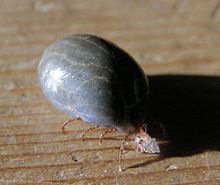Acarology (from Ancient Greek ἀκαρί/ἄκαρι, akari, a type of mite; and -λογία, -logia) is the study of mites and ticks,[1] the animals in the order Acarina. It is a subfield of arachnology, a subdiscipline of the field of zoology. A zoologist specializing in acarology is called an acarologist. Acarologists may also be parasitologists because many members of Acarina are parasitic. Many acarologists are studying around the world both professionally and as amateurs.[2] The discipline is a developing science and research has been provided for it in more recent history.[2]

Acarological organisations
edit- Laboratory of Medical Acarology, Academy of Sciences of the Czech Republic
- Tick Research Laboratory, University of Rhode Island
- Tick Research Lab at Texas A&M University
Acarological societies
editInternational
edit- International Congress of Acarology
- Societe Internationale des Acarologues de Langue Francaise
- Systematic and Applied Acarology Society
Regional
editNotable acarologists
editJournals
editThe leading scientific journals for acarology include:
See also
editReferences
edit- ^ D. E. Walter & H. C. Proctor (1999). Mites: Ecology, Evolution and Behaviour. University of NSW Press, Sydney and CABI, Wallingford. ISBN 978-0-86840-529-2.
- ^ a b Alberti, Gerd (2010). "A Manual of Acarology". Journal of Zoological Systematics and Evolutionary Research. 48 (2): 194–195. doi:10.1111/j.1439-0469.2009.00546.x.
Further reading
edit- Experimental and Applied Acarology, ISSN 1572-9702 (electronic), ISSN 0168-8162 (paper), Springer
- E. Baker (1952). An Introduction to Acarology. New York: The MacMillan Company.
- Gerald W. Krantz & D. E. Walter, ed. (2009). A Manual of Acarology (3rd ed.). Texas Tech University Press. ISBN 978-0-89672-620-8.
External links
edit- The dictionary definition of acarology at Wiktionary
- Learning materials related to acarology at Wikiversity